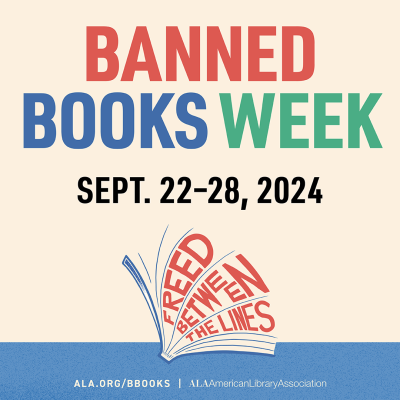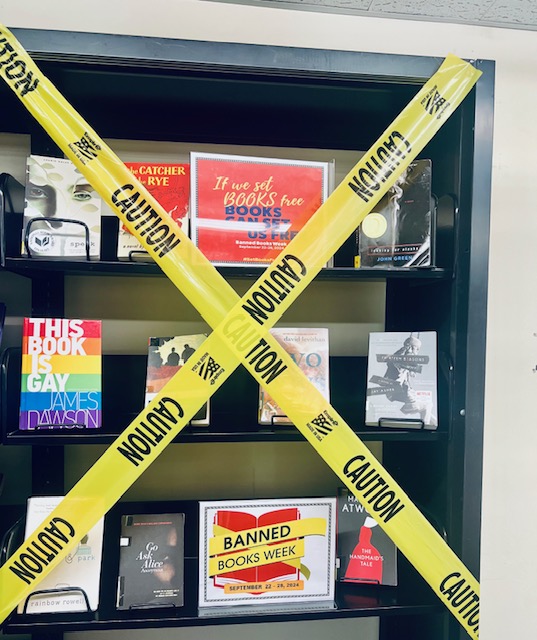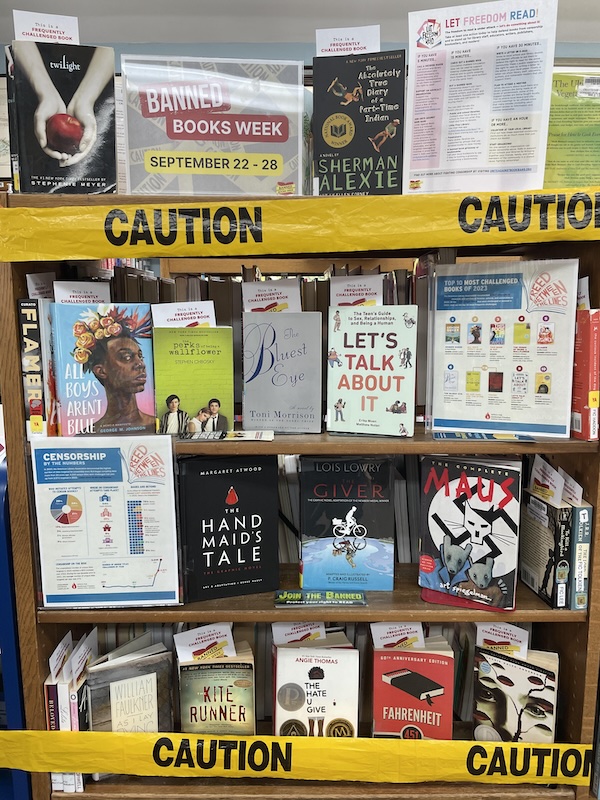
Banned Books Week began in 1982 in response to a major increase in book bans and challenges in libraries, bookstores, and schools across the United States. The goal of Banned Books Week is to emphasize the importance of free, open access to information.
This year, Banned Books Week will be from September 22 to September 28. This year’s theme is Freed Between the Lines.
Public libraries have faced increasing pressure from book bans and challenges. The ALA reported that the number of titles targeted for censorship at public libraries increased 92% in 2023 compared to 2022, and 46% of all book challenges in 2023 occurred at public libraries.
What is a Book Ban?
Book bans often start as book challenges. According to the ALA, a challenge is when an individual or a group of people ask for a book to be removed or restricted based on objections they have about the book. A book ban is when the challenged book is removed from a collection.
Books are challenged and banned for a wide variety of reasons including sexual content, offensive language, LGBTQ content, racism, violence, “anti-family” content, and political viewpoints.
Book challenges are often motivated by a desire to protect others, particularly youth, from content they feel is inappropriate or offensive. However, restricting access to these materials is censorship and violates our First Amendment rights. The ALA states:
“The right to speak and the right to publish under the First Amendment has been interpreted widely to protect individuals and society from government attempts to suppress ideas and information, and to forbid government censorship of books, magazines, and newspapers as well as art, film, music and materials on the internet.” - American Library Association
Book challenges across the country have increased significantly in the last three years. You can check out this interactive map from the ALA to see censorship by the numbers, state-by-state, from 2014 to 2023.
What can you do?
You can celebrate Banned Books Week in a variety of ways.
Exercise your freedom to read: The easiest way to celebrate is to read banned and challenged books. Talk about these reads with your peers or within a book club. Use the hashtag #bannedbooksweek on social media to spread awareness.
Report Challenges: If you hear about a book challenge in your area, contact the Office of Intellectual Freedom (OIF). The OIF estimates that it only learns of 3-18% of book challenges across the country.
Participate in your community: Libraries, bookstores, and literary communities in your area are likely hosting programs and events to celebrate the freedom to read. Show your support and see what’s happening in your neighborhood!
Banned Books
The ALA and the Office of Intellectual Freedom has been collecting data on book bans and challenges since 1990. You can check out this data, as well as lists of the most frequently challenged books, on their website.
Here is the list of the Top 10 Most Challenged Books of 2023:
- Gender Queer by Maia Kobabe
- All Boys Aren’t Blue by George M. Johnson
- This Book is Gay by Juno Dawson
- The Perks of Being a Wallflower by Stephen Chbosky
- Flamer by Mike Curato
- The Bluest Eye by Toni Morrison
- (Tied for 7th/8th) Me and Earl and the Dying Girl by Jesse Andrews
- (Tied for 7th/8th) Tricks by Ellen Hopkins
- Let's Talk About It: The Teen's Guide to Sex, Relationships, and Being a Human by Erika Moen and Matthew Nola
- Sold by Patricia McCormick
You can check out these titles and many other banned books at the Yonkers Public Library. We’ve curated this online list that links to our catalog, but you can always ask a librarian for a recommendation.
Be sure to check out the Banned Book display at your local branch!



Alison Robles is a Part-Time Junior Clerk at the Crestwood Library. She is an avid reader with a passion for YA lit, historical fiction and fantasy. A Yonkers native, she is currently pursuing an MS in Information and Library Science from the University at Buffalo.